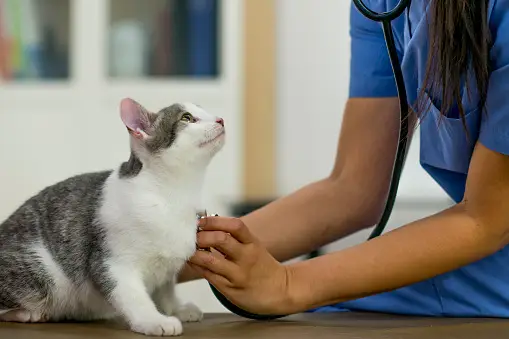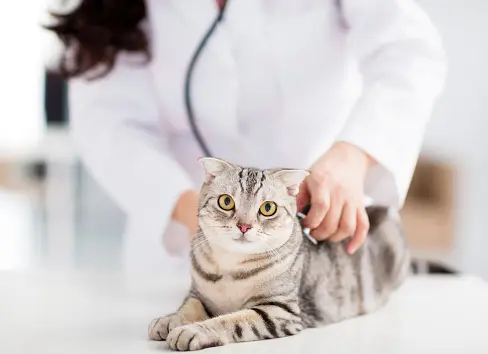
24 Apr Dealing with Feline Urinary Blockages: Recognizing Signs and Seeking Urgent Care
Feline urinary blockage is a serious medical condition that commonly affects male cats, although female cats can also be affected. It occurs when there is a blockage in the urethra, the tube that carries urine from the bladder out of the body. This blockage prevents the cat from urinating normally, leading to a buildup of toxins in the body that can quickly become life-threatening if not treated promptly.

Causes of Feline Urinary Blockages
Feline urinary blockages can be caused by various factors, ranging from diet and hydration levels to underlying medical conditions. Understanding these causes can help cat owners take preventive measures and seek prompt treatment when necessary.
Diet
Diet plays a crucial role in the formation of urinary crystals and stones, which are common causes of blockages in cats. Diets high in magnesium, phosphorus, and calcium can contribute to the formation of these crystals, as can diets that are too acidic or too alkaline.
Dehydration
Cats that do not drink enough water are at a higher risk of developing urinary crystals and stones. Dehydration can lead to more concentrated urine, which can make it easier for crystals to form and become lodged in the urinary tract.
Urinary Tract Infections (UTIs)
UTIs can cause inflammation and irritation in the urinary tract, which can lead to the formation of crystals and stones. Additionally, the presence of bacteria in the urinary tract can contribute to the formation of struvite crystals, which are a common type of urinary stone in cats.
Anatomical Abnormalities
Some cats are born with anatomical abnormalities that make them more prone to developing urinary blockages. These abnormalities can include narrow urethras or urethral strictures, which can make it easier for crystals or stones to become lodged and block the flow of urine.
Obesity
Obesity is a risk factor for urinary blockages in cats, as it can lead to decreased mobility and increased pressure on the bladder and urinary tract. Additionally, obese cats may have difficulty grooming themselves properly, which can lead to poor hygiene and an increased risk of urinary tract infections.
Stress
Stress can also contribute to the development of urinary blockages in cats. Stress can lead to changes in urinary habits and weaken the immune system, making cats more susceptible to urinary tract infections.
Other Medical Conditions
Certain medical conditions, such as diabetes, hyperthyroidism, and kidney disease, can increase the risk of urinary blockages in cats. These conditions can affect the pH balance of the urine and can also lead to dehydration, both of which can contribute to the formation of crystals and stones.

Signs of Feline Urinary Blockages
One of the most common signs of a urinary blockage in cats is straining to urinate or being unable to urinate at all. Cats with a blockage may repeatedly go to the litter box and assume the posture for urination but produce little to no urine. They may also cry out in pain while trying to urinate. Additionally, you may notice blood in the urine or a strong odor to the urine.
Other signs of a urinary blockage in cats include:
- Lethargy: Cats with a urinary blockage may appear weak or listless and may not be interested in their usual activities.
- Vomiting: Some cats with a urinary blockage may vomit, which can be a result of the buildup of toxins in the body.
- Loss of Appetite: Cats with a urinary blockage may lose their appetite and may not eat or drink as usual.
- Restlessness: Cats in pain from a urinary blockage may pace, pant, or exhibit other signs of discomfort.
- Swollen Abdomen: In severe cases, a cat’s abdomen may become swollen and distended due to a buildup of urine in the bladder.
If you notice any of these signs in your cat, it is important to seek veterinary care immediately. A urinary blockage is a medical emergency that requires immediate treatment to relieve the blockage and prevent serious complications.
Urgent Care Needs
Urgent care centers provide an important service for pet owners needing medical attention for their pet’s non-life-threatening conditions requiring prompt attention. These centers offer a wide range of services to address a variety of urgent care needs.
Infections
Urgent care centers can diagnose and treat various infections, including respiratory infections, urinary tract infections, and skin infections.
Minor Injuries
They can also provide care for minor injuries such as cuts, infections, vomiting, diarrhea, urinary tract infections, and more.
Minor Fractures
While not all urgent care centers have X-ray facilities, many can provide initial assessment and stabilization for minor fractures.
Gastrointestinal Issues
They can address issues like bowl obstructions, vomiting, and diarrhea.
Flu and Cold Symptoms
Urgent care centers can provide testing and treatment for flu and cold symptoms, including fever, cough, and sneezing.
Skin Conditions
They can diagnose and treat various skin conditions, including fleas, ticks, and rashes.

Services Offered by Urgent Care Centers
Diagnostic Services
Many urgent care centers offer on-site diagnostic services, including X-rays, bloodwork, and ultrasounds.
Minor Procedures
They can perform minor procedures such as wound suturing, splinting, and abscess drainage.
Prescription Services
Urgent care centers can provide prescriptions for medications when needed.
Be Aware
Urgent care centers serve as invaluable resources in the healthcare landscape, offering timely and convenient medical services for non-life-threatening conditions for many pets. With a wide range of capabilities, these centers meet the urgent care needs of pet owners needing prompt medical attention for their pets various ailments and injuries.
One of the key strengths of urgent care centers is their ability to provide efficient care for conditions that require immediate attention but do not rise to the level of an emergency. From infections and minor injuries to flu symptoms and skin conditions, urgent care centers offer a comprehensive array of services to address diverse healthcare needs.
Moreover, urgent care centers play a significant role in enhancing healthcare accessibility and affordability. By providing an alternative to emergency room visits for non-emergent conditions, these centers help reduce healthcare costs for pet owners and alleviate the strain on emergency departments, allowing them to focus on critical care cases.
Additionally, urgent care centers offer convenience and flexibility, with many providing extended hours and walk-in appointments. This accessibility is particularly beneficial for individuals with busy schedules or those seeking care outside of traditional office hours for those last minute pet injuries and concerns.
In conclusion, urgent care centers play a vital role in the healthcare system, providing high-quality, timely, and cost-effective care for a wide range of urgent medical needs. Their ability to offer convenience, accessibility, and comprehensive services makes them an essential component of the healthcare landscape, benefiting many pet owners.


